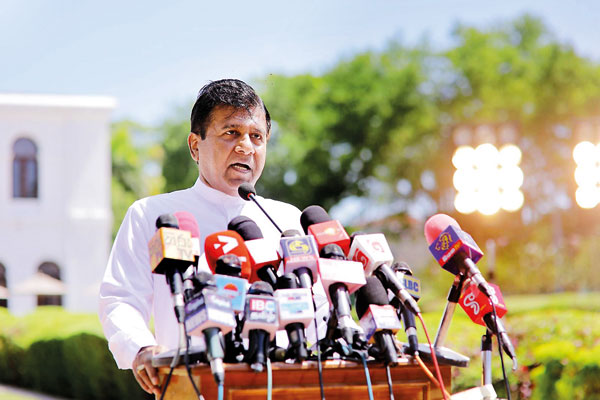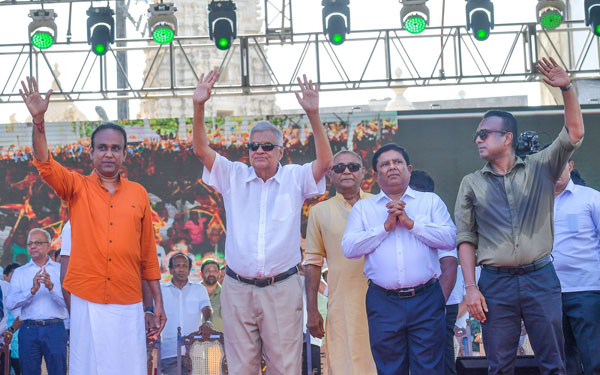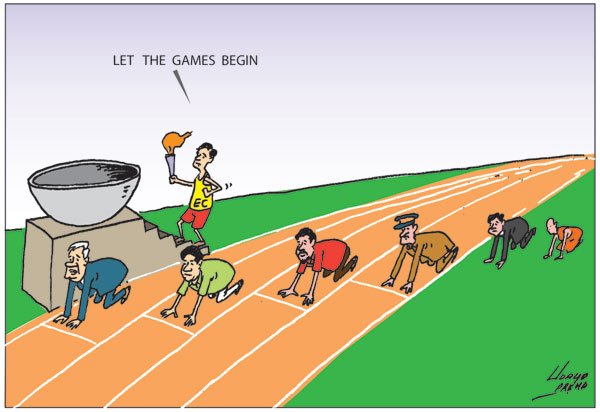Columns
- Wickremesinghe writes to Mahinda and leaders of other parties, seeking support for his independent candidature
- Namal accuses Ranil of trying to divide the party; backs businessman Dhammika Perera as candidate
- Tamil people given freedom to decide on whom to support; common candidate unlikely
By Our Political Editor
The root cause is the leadership’s fear that a faction wants to break the party in two instead of heeding a decision over whose candidature the party should back. It is against this backdrop that the SLPP politburo meets tomorrow to formally decide on the party’s presidential candidate. Given this scenario, a stormy session is expected.
The meeting comes after President Wickremesinghe informed the SLPP formally that he would be an independent candidate. The intimation came at a tripartite meeting at the presidential residence at Mahagam Sekera Mawatha (the former Paget Road). Taking part were President Wickremesinghe, his Chief of Staff Sagala Ratnayake and SLPP founder Basil Rajapaksa. Wickremesinghe, who was aware of the date of nomination as well as the elections told Rajapaksa that he was formally conveying his decision to become a candidate.

Wijeyadasa Rajapakshe, the SLFP Maithripala faction candidate addressing a news conference at Arcade to announce his decision to contest the presidential election
Last evening, this was followed up by a letter from Wickremesinghe to SLPP leader Mahinda Rajapaksa. That set out his proposed role as an “independent candidate” and sought the support of the SLPP. President Wickremesinghe said, “Whilst I have decided to be an independent candidate at the 2024 presidential election, I am seeking the support of a majority of the political parties. To ensure my victory, while I expect the support of the Sri Lanka Podujana Peramuna, I await an early response from your party. The facsimile of the letter appears on this page.
Similar letters have also been sent out to leaders of other political parties that have pledged support to Wickremesinghe. This is in keeping with an arrangement worked out earlier. This has been reported many times in these columns.
What of the “other election” which President Wickremesinghe said, he was contemplating? That remark came during a breakfast meeting on July 10 when Mahinda Rajapaksa raised a query on whether he would conduct elections. Others taking part then were Sagala Ratnayake, and Basil Rajapaksa. There was no word on it. Moreover, such a move would now cease to have legal validity since he has now taken the first step to becoming the candidate. That would be complete on August 15 when nominations are held.

With the major political parties stepping up their election campaigns following the announcement of the presidential election by the Election Commission this week President Ranil Wickremesinghe joined his first election rally in Galle yesterday. Here he is seen on stage with Ramesh Pathirana, Wajira Abeywardena, Manusha Nanayakkara and others
First to pay the deposit
On Friday, Election Commission Chairman R.M.,A.L. Ratnayake and four other Commission members—M.A.P.C. Perera, Ameer Faiz, A. Shanmuganathan and Prof. Lakshman Dissanayake—issued a Gazette notification, announcing that the presidential election would be held on September 21. Nominations will be accepted on August 15. The time frame for this has been set as between 9 a.m. and 11 a.m. at the office of the Election Commission in Sarana Mawatha, Rajagiriya. The nomination and election dates were revealed in these columns last week.
On Thursday, Parliament’s Secretary General Kushani Rohanadeera issued Ranil Wickremesinghe with a certificate (a legal requirement) as proof of being an elected member of the legislature. This was produced by the President’s brother, Channa Wickremesinghe, and President’s Counsel Ronald Perera when they placed a deposit of Rs 50,000 with the Chief Financial Officer of the Election Commission. Perera is the campaign manager for Wickremesinghe. A former parliamentarian for Dompe electorate, Sarath Keerthiratne, tried to become the first to pay the deposit but Channa Wickremesinghe and Perera were ahead and beat him to it. He thus became the second. Others who paid deposits on Friday were Oshala Herath of the Abhinawa Niwahal Peramuna and A.S.P. Liyanage of the Sri Lanka Workers Party.
President Wickremesinghe’s letter to Mahinda Rajapaksa will come up for discussion at a meeting of the SLPP politburo tomorrow. The expectation is that it will be approved by a majority. However, opposition against the nomination of Wickremesinghe has been building up in the past many weeks within the party. It centres on a claim that a move is being made allegedly by Wickremesinghe to split the party. In the past two days, emissaries have met Mahinda Rajapaksa at his Wijerama residence near the British High Commission to seek his support for Wickremesinghe. There were assurances of greater cooperation if he wins the presidency.

The letter Wickremesinghe sent to Mahinda Rajapaksa
In hindsight, it is clear, that a delay on his part in formally declaring his candidature at the presidential election was a contributory factor to the generation of bad air over Wickremesinghe’s candidature and the SLPP. Of course, he then explained it would not have been possible for him to grant deeds and houses to the homeless if he did so. It could have been construed as an election offence. The frictions began somewhat mildly with a high-level media committee. There, Nimal Lanza, who was assigned a bigger political task soon after Wickremesinghe took over as President, proposed that they drop all the Rajapaksas and carry on their election campaign. Lanza declined a ministerial position and found himself an office in the Presidential Secretariat. His task was to win over SLPP parliamentarians and form a political base. During that period, he wined and dined several parliamentarians amidst reports, not denied by him, that some 29 were due to cross over. Every week he had the opportunity of meeting President Wickremesinghe to brief him on progress, but his moves faded away. However, he was able to form a New Alliance with members of the SLPP. It has hence tied up in an alliance with a faction of the Sri Lanka Freedom Party (SLFP) headed by Nimal Siripala de Silva.
It was Basil Rajapaksa who raised issue over Lanza and the backing his demands received from Duminda Dissanayake, a one-time minister. Wickremesinghe had raised the matter and implored them the need to work as a team. This had been conveyed to Basil Rajapaksa. This notwithstanding another issue has weighed in heavily. At least two ministers are known to be strongly in favour of the SLPP supporting Wickremesinghe with a third identified as “playing for both sides.” Exacerbating the issue has been claims that some in Colombo together with district leaders of the SLPP were advocating a breakaway from the SLPP—a development that has begun to cause serious concerns for the party leadership. At least two senior members confirmed that they have been making claims that some 38 members led by a one-time minister resident in Colombo were in favour of a breakaway—a claim that is being hotly disputed. Some of the members have, with no basis, accused Wickremesinghe of encouraging the rival group. However, sources close to Wickremesinghe flatly deny the accusations. At a time when there is a presidential election in the offing, there are no media spokespersons who are willing to comment on the issue. Hence, the outcome will be known only when it is put to test tomorrow at the SLPP politburo meeting. It is also likely that the politburo may ask the presidential candidate they endorse to sign a pledge to fulfil the SLPP’s priority policies which are incorporated in Mahinda Chinthana (thoughts of Mahinda). Another is likely to be an assurance not to divest profit-making state ventures.
The only spokesperson for some sections of the dissident groups is the SLPP’s National Organiser Namal Rajapaksa. He has been making veiled but bitter comments against Wickremesinghe. He has said that the SLPP did not want to field a losing candidate. It is known that Namal Rajapaksa is a staunch backer of the candidature of Dhammika Perera, a millionaire businessman and casino owner. He has also been building up a support base not only in districts in the south but also in the north too. A segment is calling for his nomination. Sections backing Wickremesinghe, however, have not reacted so far to Namal Rajapaksa’s comments. They remain confident that the SLPP politburo will endorse Wickremesinghe’s candidature. Even if such approval is the outcome, it leaves behind a serious question. Not all members of the SLPP will join the election campaign with the same enthusiasm and vigour. An example would be the faction backing Namal Rajapaksa. This is a significant aspect since the main political machinery that would back Wickremesinghe will come from the SLPP. The United National Party (UNP) remains disorganised and their grassroots-level bodies countrywide, barring a few, are in disarray.
On Thursday, Justice and Constitutional Affairs Minister Wijeyadasa Rajapakshe another would be candidate held a news conference at the Arcade in Torrington to announce his foray. It was made clear that he would be the candidate of the Sri Lanka Freedom Party (SLFP) faction led by former President Maithripala Sirisena. Interesting enough, he listed all the measures that have been carried out by the Ministry of Justice and said he was personally responsible for them. Among them, he said, were, “Frauds, corruption, commissions and extortions have become an idol to the society, which has led the country to almost destruction. To prevent them, my efforts to pass the new anti-corruption act are immeasurable. It is not a secret to the people. A fully independent Bribery or Corruption Investigation Commission was established and strict rules on disclosure of assets and liabilities were included. This is the best anti-corruption law among Asian countries.

“I have passed the Election Expenses Regulation Act so that electoral corruption can be minimised and the youth and scholars can take over the political machinery of this country. The Proceeds of Crime Bill has been drafted and should be passed. The process of administration of justice has been simplified and many steps have been taken to reduce the delay in disposal of cases. Laws were passed to curb fraudulent land registrations and necessary legal policies were adopted to move the country’s economy in the right direction. Steps have been taken to promote national unity and reconciliation from the grassroots level through the Office of National Unity and Reconciliation Act. It has been implemented under the Grama Rajya system. I request that we realise that it is the responsibility of all of us to create a harmonious country within the same Sri Lankan identity by cultivating peace and harmony as well as spiritual virtues in society….”
He also said,“Less than 10 per cent of those in the SLFP are destroying that party. More than 90 percent of the SLFP are involved in the electoral mechanism helping me.”
What Minister Wijeyadasa Rajapakshe did not say is when he plans to resign as Minister. According to a source close to him, he plans to stay on and serve the present Cabinet of Ministers. That will of course be a first. That no doubt will require the approval of the other candidate—President Wickremesinghe who chairs the cabinet.
Yet another candidate who made his announcement is Field Marshal Sarath Fonseka. In a post to X, formerly Twitter, he said, “I wish to announce my presidential candidacy to the people of Sri Lanka. For 76 years, we have been led by an inept political group that has led us to bankruptcy. For Sri Lanka to grow, we need to crush corruption. We need to leverage our natural resources to boost income generation. This is my formal and official announcement as the presidential candidate of Sri Lanka for the 2024 Presidential Election. I invite every Sri Lankan to join me to take Sri Lanka forward.”
It is not immediately clear how Field Marshal Fonseka will contest the presidential election. At present, he is in litigation with his party (Samagi Jana Balawegaya) leadership against a move to expel him from the party. Hence, it is highly unlikely they would endorse his candidature. Moreover, the SJB candidate will be the party leader, Sajith Premadasa.
The Frontline Socialist Party (FSP) is also planning to field a candidate. It is looking at Wasantha Mudalige, a former convenor of the Inter-University Students Federation (IUSF). The move, no doubt, will wean away some votes from the Janatha Vimukthi Peramuna (JVP)-led National People’s Power (NPP). Already, the NPP has come under strong criticism after one of its leaders, K.D. Lalkantha, has been making threatening remarks to carry out attacks on the media once the election is concluded.
Tamil voters of the north and the east are no different from the rest of the country. Most of the people are undecided on whether to vote and if so, whom to vote as first and second preferences. This dilemma to a great degree will get resolved with time and their positions will become clearer nearer to September 21.
Previously, in the Tamil polity, there had been a voice of authority that could demand and drive the Tamil votes in a particular direction. From the time of S.J.V. Chelvanayakam, leaders such as Appapillai Amirthalingam, S. Sivasithamparam and more recently R. Sampanthan had the stature and authority to guide the people in a direction. Even during the armed conflict, the LTTE Leader V Prabakaran held that authority at the point of a gun.
Post-Sampanthan, there is no such commanding voice or a single leader and this has given the Tamil vote base a freewill. This has been a major factor in the indecisiveness of the Tamil voter base right now.
Through recent history, the Tamils have collectively shown their disapproval of the Rajapaksas. They went to the extent of voting in bulk to General Fonseka in
2010 and again to former president Sirisena in 2015. This clearly means any candidate who might seek or get the explicit support of the Rajapaksas can safely bet that the Tamils’ vote may not be coming their way.
In the recent past, beyond opposing Rajapaksas, Tamils have rarely been engaged or explicitly supportive of any particular Sinhala presidential candidate. In the pre-presidential era, the only Sinhala leader that Tamils had been keenly supportive of was Sirimao Bandaranayake who through her policies encouraged the Tamil farmers and producers and created a prosperous middleclass in a very short space of time in the north and east.
Tamils have also recognised former president Maithripala Sirisena as a loyal and grateful leader who visited the north the most, as a leader, since independence. He also made a concerted effort to pay back the Tamils by releasing many thousand acres from the military’s and other state institutions’ custody.
Tamils also take preference to known faces who are educated, established, English-speaking leaders. The current president Ranil Wickremesinghe ticks all those boxes. His career has also spanned a long period in Sri Lankan politics since pre-LTTE days and during the thirty-year war and post-war. Tamils also consider him a non-racist leader. These attributes qualify the current president as a favourite of a large portion of the population if he had delivered on some of his promises. As he started his term as president, in 2022, he publicly committed to implementing the 13th amendment to the Constitution. However, to date that has not materialised. He spoke considerably about war-affected regions to be treated on a preferential basis during the first two budgets but nothing tangible was delivered.
Unfortunately, President Wickremesinghe has not had the time to fulfil many of the pledges he made to the northern polity. The business community including some of the members of the Chamber of Commerce of the north, farming communities and Tamil youth want change as they believe that they have tried and tested many of the main candidates at various elections and neither Premadasa nor Wickremesinghe has delivered anything tangible for them to remember. This perception has given rise to the popularity of Anura Kumara Dissanayake among these groups to consider him as a fresh and young leader. These groups can be trendsetters but they are still waiting to see what precisely Dissanayake will publicly commit to the Tamils.
Premadasa on the other hand made some impact during his last two visits to the north and the northwest where he publicly committed that he would implement the 13th amendment in full as a political solution to address the demand for devolution. Although this captured the hearts and minds of Tamils immediately, his limitation on speaking about the 13th amendment as the final settlement seems to have eroded that initial excitement.
There is also sufficient discourse in the Tamil media encouraging the idea of a Tamil common candidate. The backers of this idea lack credibility. A majority of them are unelected persons or persons defeated in recent elections. Among them, analysts say three elected parliamentarians: the former Supreme Court Judge and former Northern Province Chief Minister C.V. Wigneswaran, and the other two Parliamentarians with local and foreign backing are at their best. It is also a known fact that these are the same parliamentarians who defied the then TNA’s collective decision not to back the current President but suspected to have voted for him in the secret ballot back in 2022. This was during the election of President Wickremesinghe in Parliament.
With such credibility deficiency of the backers of this common candidate idea, and the fact that the premier party of north and east the Ilankai Thamil Arasu Katchi (ITAK)—the Federal Party which has publicly kept away from this idea–meant that this idea is likely to fizzle out. Although there is no single voice that commands the Tamil polity anymore, the ITAK as a party remains the most popular party of Tamils. Although there are a handful of dissenting voices within the ITAK as well wanting to support the idea of the common candidate, at a recent Central Committee meeting of that party, out of 33 members who attended the meeting only three spoke in favour of the idea. Only one of the three members is a sitting Member of Parliament and the other two were defeated in the last general election. Out of the five Members of Parliament of the ITAK, only one, S Sritharan, publicly supports this idea of a common candidate. As the weeks go by, the political scenario in the north will become clearer. That is particularly after the nominations on August 15.
Interestingly the political landscape in Colombo, the main base for most political parties other than those in the north and east, will change significantly. The splits in the SLPP into smaller groups revealed an interesting picture—most are looking for or have found ties that will help them return to Parliament the next time. Others are still trying.
Buying or selling electronics has never been easier with the help of Hitad.lk! We, at Hitad.lk, hear your needs and endeavour to provide you with the perfect listings of electronics; because we have listings for nearly anything! Search for your favourite electronic items for sale on Hitad.lk today!


To back Ranil or not: Decision tomorrow at SLPP politburo meeting
View(s):